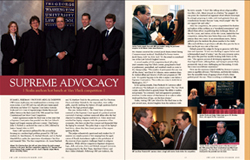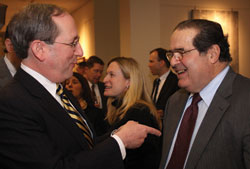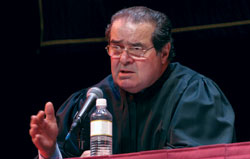Supreme Advocacy
Scalia anchors hot bench at Van Vleck competition
GW’s Lisner Auditorium was transformed into a riveting courtroom on Jan. 22 as GW Law’s top oral advocacy teams argued a fictitious case before U.S. Supreme Court Justice Antonin Scalia and U.S. Court of Appeals Judges Marsha Berzon and Jeffrey Sutton in the final round of the 59th annual Van Vleck Constitutional Law Moot Court Competition.
Scalia’s appearance marks the third time in four years that a Supreme Court justice has presided over the Law School’s largest and longest-running advocacy contest. Chief Justice John G. Roberts Jr. anchored the court in 2006, followed by Justice Samuel Alito in 2007.
Some 1,400 spectators gathered for the proceedings, focusing on a modern legal problem penned by GW Law students 2L Sara Brauner, 3L Michael Rhoads, and 2L Rachel Mandell-Rice under the supervision of professors Orin Kerr and Amanda Tyler. The four competitors—2L Lucas Hanback and 3L Matthew Yoeli for the petitioner, and 3Ls Christina Davis and Julian Helisek for the respondent, were unflappable, expertly tackling the battery of tough questions fired at them by the high-powered judges.
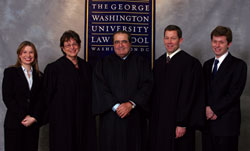
3Ls Christina Davis (far left) and Julian Helisek (far right) emerged victorious in this year’s Van Vleck competition, judged by U.S. Supreme Court Justice Antonin Scalia (middle) and U.S. Court of Appeals Judges Marsha Berzon and Jeffrey Sutton.
The case, Melissa Kelly v. The United States of America, centered on the Supreme Court appeal of a political activist convicted of setting a military memorial ablaze after she had objected to adding religious symbols to it. Police seized and searched her laptop computer with the permission of her roommate, who later revoked her consent and demanded that the laptop be returned. The police kept a copy of the laptop’s hard drive, where they later found pictures of the suspect igniting the fire.
The judges exhaustively questioned each student for 15 minutes on complex points of law ranging from the application of Fourth Amendment rights to the prohibition of the exercise of pre-emptory challenges based on religious affiliation. While all four competitors displayed eloquence, logic, skill, and poise, Davis and Helisek emerged victorious, earning prizes for the Best Team, Best Brief (Davis), and Best Oralist (Helisek). Following GW Law tradition, the two winners received the coveted Jacob Burns Award during Commencement weekend. Established by former trustee Jacob Burns, LLB ’24, Hon. LLD ’70, the award is considered one of the Law School’s highest honors.
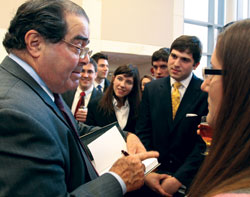
Justice Scalia spends time with GW Law students during the post-event reception in the Marvin Center Grand Ballroom.
A record number of 124 competitors faced off in this year’s semester-long Van Vleck contest, going head to head in preliminary, quarterfinal, and semifinal rounds en route to the championship. “The number of participants this year was off the charts,” says David M. Johnson, senior assistant dean for student affairs and director of advocacy programs at GW Law. “It’s a pretty big prize to be able to argue a case before a Supreme Court justice. This is why you come to study law in Washington, D.C.”
In his opening remarks, Dean Frederick M. Lawrence called oral advocacy “the hallmark of a civilized society.” The Van Vleck contest, and law school in general, fosters “the ability to analyze and persuade,” he continued, “and oral argument is persuasion at its best. It is the essence of what lawyers do in order to utilize words and the force of logic, not the force of arms.”
Scalia, visiting GW Law School for the third time in the past several years, elicited laughter from the audience with his witty remarks. “I don’t like talking about religious affiliation like a club, where you put on a button,” he quipped. At one point, he countered an argument about atheist stereotypes by jokingly proposing to strike rock band guitarists from jury consideration because they are “crazy, weird people” who “do not support law and order.”
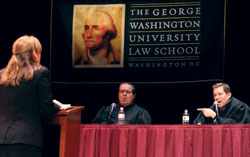
Justice Scalia and Judge Sutton team up on 3L Christina Davis, who argued for the respondent.
After the competition, the justice congratulated the finalists and authors of the problem on a “wonderful presentation” and offered them advice on perfecting their technique. Berzon, of the 9th Circuit, and Sutton, of the 6th Circuit, lauded the four competitors, stating they were better than some of the advocates in their own courts. In an extraordinary move, Sutton publicly gave the students the phone number to his clerks’ office and told them to give him a call after they pass the bar so they can be put on a case in his court.
Helisek praised the judges for being so generous with their time and expertise. “It was very thrilling to appear before such a distinguished panel of judges,” says the prize-winning orator, who spent the past four months working with Davis on the case. “The rigorous process of developing arguments, testing their logical limits, refining them, and trying to present them persuasively was at once challenging and fascinating. It truly was a once-in-a-lifetime experience.”
Davis says the experience helped solidify her decision to pursue a career in appellate advocacy. “Few lawyers, and fewer law students, have the incredible honor of arguing in front of such a distinguished panel,” she says. “There is nothing as exhilarating.”
|
|

